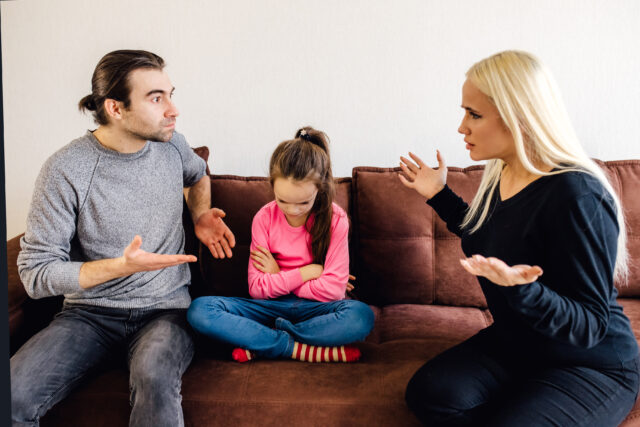Growing up, our parents are supposed to be our safe haven, our guiding lights. But sometimes, the reality is far from that ideal. Toxic parents can leave lasting scars that affect us well into adulthood. It’s not always easy to recognise the signs, especially when we’ve normalised their behaviour. But identifying these patterns is the first step towards healing and creating a healthier relationship with yourself.
1. You apologise excessively, even when it’s not your fault.

You find yourself saying “sorry” all the time, even for things you didn’t do or that aren’t your responsibility. It’s become a knee-jerk reaction, a way to appease people and avoid conflict. This constant apologising might stem from a childhood where you were blamed for things beyond your control or made to feel responsible for your parents’ emotions, Psych Central explains.
2. You struggle to identify and express your emotions.

Maybe you feel numb, disconnected from your feelings, or have a hard time putting your emotions into words. This could be a result of growing up in an environment where your emotions were invalidated, dismissed, or even punished. You might have learned to suppress your feelings to avoid conflict or protect yourself, but it’s important to remember that your emotions are valid and deserve to be acknowledged.
3. You’re a chronic people-pleaser.

You constantly prioritise everyone else’s needs and wants, often at the expense of your own well-being. You might have difficulty saying “no,” even when you’re feeling overwhelmed or overextended. This people-pleasing behaviour might stem from a childhood where your needs were secondary to your parents’ or where you were rewarded for being compliant and agreeable.
4. You have a harsh inner critic.

Your inner voice is relentless, constantly criticising your every move and reminding you of your flaws. You’re your own worst enemy, always striving for perfection but never feeling good enough. This negative self-talk might be an echo of your parents’ critical voices, internalised over time.
5. You never learned how to set boundaries.
 Source: Unsplash
Source: Unsplash You find it hard to say “no” to requests, even when they’re unreasonable or infringe on your personal space. You might feel guilty for prioritising your own needs or fear disappointing people. This difficulty with boundaries might be a result of growing up in an environment where your personal space wasn’t respected or where your needs were constantly overlooked.
6. You need constant reassurance and validation.

You constantly seek approval and reassurance from people, whether it’s through social media likes, compliments, or achievements. You might feel like you’re not good enough unless someone else tells you that you are. This need for external validation could stem from a lack of positive affirmation during childhood or from being constantly compared to other people.
7. Trusting people isn’t something that comes naturally.

Trust doesn’t come easily to you. You might be suspicious of people’s motives, have difficulty opening up to people, or fear getting hurt. This lack of trust can make it challenging to form deep and meaningful relationships. It could be a result of past experiences where your trust was broken, or a reflection of the inconsistent or unpredictable behaviour of your parents.
8. You feel responsible for other people’s happiness.

You might feel like it’s your job to fix other people’s problems, make them happy, or keep the peace. You might feel guilty when people are unhappy or blame yourself for their problems. This tendency to take on people’s burdens could stem from a childhood where you were made to feel responsible for your parents’ emotions, or where you were the “peacekeeper” in a dysfunctional family dynamic.
9. You have a hard time accepting compliments.

When someone offers a genuine compliment, you might deflect it, downplay it, or even flat-out deny it. It’s like you don’t believe you deserve the praise or that it’s not genuine. This could stem from a childhood where your accomplishments were overlooked or belittled, leading to a deeply ingrained feeling of not being good enough.
10. You struggle with decision-making and assertiveness.

You might have a hard time making decisions on your own, fearing that you’ll make the wrong choice or disappoint someone. You might also struggle to speak up for yourself and assert your needs, preferring to go along with what other people want to avoid conflict. This could be a result of growing up in an environment where your opinions and choices were not valued or respected.
11. You have a tendency to isolate yourself.

You might prefer to be alone rather than risk social interaction or vulnerability. You might withdraw from social events, avoid close relationships, or have difficulty trusting people. This isolation can be a way to protect yourself from further hurt or rejection, but it can also lead to feelings of loneliness and isolation.
12. You have a hard time letting go of the past.

You might hold on to grudges, replay past hurts in your mind, or struggle to forgive yourself or other people for past mistakes. This inability to let go can keep you stuck in a cycle of anger, resentment, and pain. It’s important to learn from the past, but not let it define your present or future.
13. You have a fear of abandonment or rejection.

The fear of being abandoned or rejected can be deeply rooted in childhood experiences of neglect or inconsistent parenting. You might find yourself constantly seeking approval, going to great lengths to please people, or sabotaging relationships out of fear of getting hurt. It’s important to recognise that this fear is a learned behaviour and that you are worthy of love and connection.




